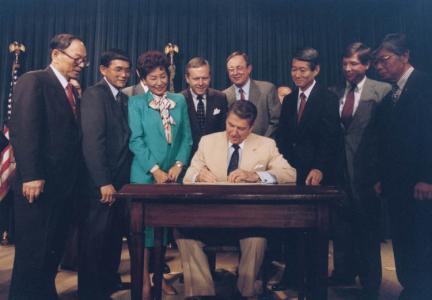US President Ronald Reagan signed the Civil Liberties Act of 1988 into law on August 10, 1988. The Act formally apologized, on behalf of the United States, to Japanese-Americans who were imprisoned in make-shift camps throughout the US during World War II, and provided $20,000 in compensation for each survivor. The express objective of the bipartisan measure was to "discourage the occurrence of similar injustices and violations of civil liberties in the future."
Roughly two-thirds of the approximately 120,000 people detained were US citizens.
The government commission, whose work and investigation led to the enactment of the law, exhaustively investigated the internment, and concluded that it was a result of racial prejudice, wartime hysteria, and a failure of political leadership--and not legitimate security concerns.
The Act also established a fund to support public education about the internment and its causes, so that such acts of mass coercion and imprisonment never occur again.






















